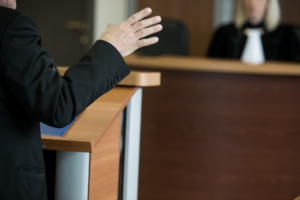
A deposition serves as an essential element of the discovery phase in personal injury proceedings. It entails a witness giving testimony under oath outside of the courtroom, with this recorded statement potentially being utilized later during trial or for further discovery. In this setting, lawyers from all parties involved are granted the chance to ask questions to the witness.
Who Gets Deposed in a Personal Injury Case?

In the context of personal injury litigation, multiple people can expect to give depositions. The plaintiff – the individual initiating the lawsuit – will normally be asked to recount their experience of the event and describe their injuries in detail. Similarly, the defendant will have their deposition taken to share their side of the story and address any claims made against them.
Additionally, any witnesses who have direct knowledge of the events in question may be deposed. This includes eyewitnesses who saw the incident occur, medical professionals who treated the plaintiff, and any expert witnesses whose testimony could shed light on technical aspects of the case.
The Purpose of Depositions
Depositions serve multiple crucial purposes in personal injury cases, all aimed at ensuring a fair and comprehensive legal process. The following are some of the primary purposes:
Preserving Testimony
One function of a deposition is to secure witness testimony ahead of the trial. This process is especially vital if there’s any chance that a witness might not be able to attend in person, perhaps because they’re too far away, facing health challenges, or encountering other unexpected issues.
Through recording their depositions, lawyers have a better chance that the court will consider these witnesses’ accounts, even if they can’t provide their testimony live during the legal proceedings.
Discovery of Facts
Through depositions, attorneys have the opportunity to uncover and verify information that isn’t immediately apparent from physical evidence. Through their lines of questioning, lawyers may reveal further insights into the events in question or bring to light critical new facts that can bolster their case. This process helps paint a fuller picture of what happened.
Assessing Credibility
Observing how witnesses or parties respond under questioning gives insight into their credibility. This includes evaluating body language, tone, and demeanor, which can signal confidence levels or hint at deception. These are factors that aren’t always apparent on paper but can significantly influence a case’s outcome.
Facilitating Settlements
The information revealed during depositions can materially affect how parties view the strengths and weaknesses of their cases, potentially leading to settlements. If a deposition uncovers strong evidence against one party, it may motivate that party to offer or accept a settlement rather than risk going to trial with unfavorable testimony looming.
How a Personal Injury Plaintiff Can Prepare for a Deposition
Preparing for a deposition is crucial for any plaintiff involved in litigation. Adequate preparation helps ensure that the deposition proceeds smoothly and that the plaintiff presents their best possible case.
Here are some key steps a plaintiff can take to prepare for a deposition:
Understand the Process
As a plaintiff preparing for your deposition, it’s helpful to understand the process to ensure you’re ready for what lies ahead. First, depositions typically take place in an attorney’s office, not in court. Even though you’re not in court, you’re still under oath. Everything you say will be recorded by a court reporter who is responsible for creating an official transcript of the proceedings.
Review Relevant Documents
Prior to your deposition, make sure to go over all essential documents connected with your case thoroughly. Look at medical reports, any available police records concerning the accident, and correspondence related to what happened.
Revisiting these details will jog your memory and support a consistent recount during the deposition. You can expect attorneys to draw from these references while they question you, so being familiar with them will help you respond confidently and accurately.
Practice Answering Questions
Attorneys often conduct mock depositions to help plaintiffs practice responding to questions. This rehearsal can help plaintiffs become more comfortable with the deposition format and improve their ability to answer questions clearly and confidently.
Stay Calm and Collected
It is essential for plaintiffs to remain calm and composed during the deposition. They should listen to each question carefully, take their time to think before responding, and avoid becoming defensive or argumentative. Maintaining a professional demeanor can significantly impact how their testimony is perceived.
An Experienced Personal Injury Lawyer Can Help You Prepare For a Deposition
If you have questions about a deposition or need help with a personal injury claim, schedule a free consultation with a skilled personal injury attorney. Our legal team at Runion Personal Injury Lawyers, uses our vast resources and skills to pursue maximum compensation for your claim. We work with some of the best experts in their fields to strengthen your case.
If you’ve been injured anywhere in Phoenix, AZ, or Albuquerque, NM, call (602) 600-9000 now or contact us online for a free case evaluation with an experienced personal injury attorney.

